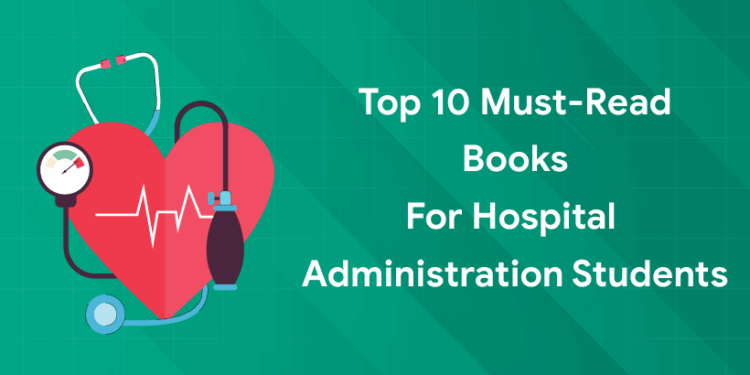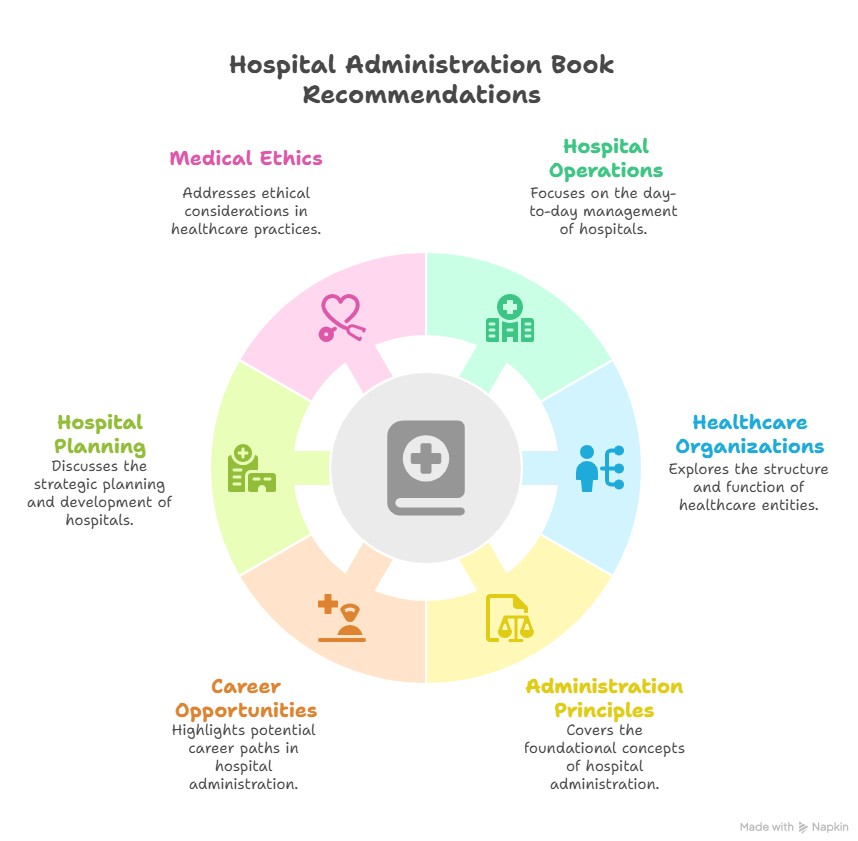Table of Contents
Books have a certain appeal to both reviewers and readers, particularly in disciplines as intricate as hospital administration. When reputable experts and millions of readers agree on important titles, it indicates that these books offer insightful advice on how to run hospitals successfully in the face of changing healthcare issues. It is more crucial than ever to comprehend hospital administration because healthcare systems around the world are under strain.
Renowned for his astute insights into institutional dynamics, Craig Calcaterra praises Brian Alexander’s The Hospital as an insightful examination of the economic and social challenges faced by community hospitals. His viewpoint, which is derived from his coverage of big league baseball and cultural developments, emphasizes the profound effects that hospital administration has on local populations. In addition to Alexander’s work, additional writers such as Dr. David Edward Marcinko and Sharma Yashpal provide strategic and useful advice based on their decades of expertise in the medical field.
Explore Your Future in Hospital Administration! Enroll now
Even though these well-known books offer tried-and-true frameworks, readers looking for content catered to their unique Hospital Administration requirements could think about writing a customized Hospital Administration book that incorporates these tried-and-true strategies. By fusing professional insights with your particular issues, this personalized approach assists you in concentrating on the elements most pertinent to your background and objectives.
Top 10 Must-Read Books for Hospital Administration Students
1. The Hospital
1: What is the primary role of a hospital administrator?
Experienced journalist Brian Alexander, who has a track record of examining American society and healthcare, focuses on the hardships of a small-town hospital in Bryan, Ohio, bringing the human aspect of the complicated problems facing the American healthcare system to light. You learn about the impact of health care consolidation, the financial strains on small hospitals, and firsthand accounts like the one of a diabetic patient battling for his limbs. The book illuminates structural problems in public health and hospital administration that many people ignore through these stories. This book provides a straightforward, unvarnished viewpoint on how hospitals function within broader economic and social factors.
Hospital Administration Course with Assured Career Growth
Hospital Administration Course by Entri App: Master essential healthcare management skills, gain certification, and secure top roles in leading hospitals
Join Now!2. Hospitals & Healthcare Organizations
Dr. David Edward Marcinko provides a thorough analysis of the intricate problems that health care organizations face today, drawing on his vast experience as a health care economist and former board-certified surgeon. With the help of operational tools and real-world case studies, you’ll discover useful advice on how to handle declining sales, growing expenses, and changing customer demands. The book gives you foundations for enhancing clinical efficiency and governance while delving into Lean management practices and regulatory compliance necessities like OSHA and HIPAA. This book is especially helpful if you’re implementing health IT advances like electronic medical records (EMRs) and social media collaboration, or if you’re managing hospital inventories or improving the revenue cycle.
3. Hospital Administration Principles and Practice
Sharma Yashpal saw recurring discrepancies between hospital management theory and its actual implementation while working in the medical field. This book gives you a thorough understanding of the everyday procedures and guiding concepts of efficient hospital management, including staff management, patient care coordination, and resource allocation. Based on actual events from diverse healthcare settings, you’ll discover insights intended to help optimize operations and enhance institutional efficacy. This book offers useful information to improve your operational decision-making if you work in hospital management or healthcare administration and are looking for a well-researched, practical reference.
4. Opportunities in Hospital Administration Careers
What happens if a seasoned medical practitioner looks at hospital administration employment options? I. Donald Snook provides a concise manual that guides you through the many hospital administration disciplines, from overseeing nursing staff to managing budgets. You acquire specific knowledge about daily schedules, expected pay, and the abilities required for positions such as marketing specialist or HR director. This book is appropriate for anyone thinking about pursuing a long-term career in hospital administration since it will help you identify the best course of action and use industry resources to properly prepare for job searches. It’s a concise guide that outlines exactly what entering this area takes without overpromising.
Hospital Administration Course with Assured Career Growth
Hospital Administration Course by Entri App: Master essential healthcare management skills, gain certification, and secure top roles in leading hospitals
Join Now!5. Hospital Administration
D. C. Joshi delves deeply into the specifics of running healthcare facilities with clarity and accuracy, in contrast to most hospital administration texts that only touch on the surface. Joshi makes difficult subjects like staffing and organizational behavior understandable by guiding you through everything from legal issues to materials and financial management, drawing on decades of practical experience. A thorough overview of hospital operations is provided by the in-depth chapters on divisions including radiology, pharmacy, and emergency services. Whether you’re a rookie management or an experienced healthcare professional looking to broaden your knowledge, this book is ideal for anyone who wants to understand the administrative complexities of hospitals.
6. Hospital Administration and Management
Joydeep Das Gupta created this book to provide structure and clarity to a complicated area after examining a number of hospital administration techniques. With the help of useful examples and frameworks scattered throughout the chapters, you will acquire understanding of important operational domains like resource allocation, patient flow optimization, and regulatory compliance. This book is appropriate for students preparing for jobs in health services management as well as healthcare administrators looking to increase hospital efficacy and efficiency. Despite being packed with content, it offers a targeted examination of hospital systems free of superfluous jargon, making it an easy-to-use resource for anybody looking to learn more about administrative problems and solutions.
7. Hospital Planning and Administration
Dr. Pradeep K. Agarwal’s targeted manual on hospital planning and administration developed from the necessity to manage the intricate interactions between hospital departments. Based on his vast expertise, Agarwal describes how to cultivate the leadership abilities necessary for overseeing IT, marketing, finance, and human resources in healthcare environments. You gain knowledge of particular strategies for maintaining medical records, integrating quality management, and even controlling biological waste and public relations. With its practical insights into planning, organizing, staffing, managing, and directing healthcare divisions, this book is ideal for students and healthcare professionals who want to grasp the operational foundation of hospitals.
8. This Is Going to Hurt
This is the book you should read if you only read one from this list. It’s enlightening and motivational. This collection of humorous yet educational stories from Adam Kay’s gynecological career begins when he was applying to medical school. He explains how the admissions procedure is not always successful in selecting students who possess the necessary skills for the job and is somewhat capricious. In this book, he continues by discussing his experiences as a junior physician, including witnessing his first death and saving his first life. He provides genuine insight into what it’s like to be a young physician in the NHS.
9. Where There Is No Doctor: A Village Healthcare Handbook
This book, which began as a healthcare manual based on the author’s experiences in a western Mexican community, attempts to educate readers on how to handle medical problems even in remote locations where access to professional treatment may be limited. Although it’s one of the more thick books on this list, it’s still worthwhile to read if you want to learn more about what medicine may be like in underdeveloped nations. Additionally, you’ll pick up some useful suggestions in the process. The crucial actions to prevent, identify, and treat common health disorders are described in an educational way, ranging from AIDS and malaria to abortion and drug addiction.
10. Do No Harm
Neurosurgeon Henry Marsh delves into the realities of holding someone’s life in your hands in this enlightening account of a doctor’s experiences. It has been called “A lesson in the need for hope when faced with life’s most difficult decisions, and an unforgettable insight into the countless human dramas that take place in a busy modern hospital.”
Marsh will change your mind if you believe that neurosurgery is solely about precise technique, expertise, and a steady hand. You must be able to accept the repercussions of the painful daily decisions that must be made quickly. A neurosurgeon typically needs to do procedures that leave the patient with the lesser of two evils, as he describes here (e.g., paralyzing the patient to save their life). What happens if everything goes wrong, even if the operation is expected to go well? How would you handle it?
Tips for Hospital Administration Students
Here are ten quick pointers for students studying hospital administration:
1. Recognize Healthcare Systems
Find out how teaching, private, and public hospitals are run and financed.
2. Learn about Healthcare Ethics & Laws
Learn about EMTALA, HIPAA, and other important healthcare laws.
3. Concentrate on Core Subjects: Health IT, HR, quality management, operations, and healthcare finance.
4. Acquire Real-World Experience
Volunteer or intern in a hospital to see how administration is done in the real world.
5. Develop Your Leadership Capabilities
Practice making decisions under pressure, managing a team, and communicating.
6. Study Medical Technology
Learn how to use hospital information systems such as Cerner or Epic.
7. Create a Network of Professionals
Attend healthcare conferences and make connections with academics and business leaders.
8. Stay Informed on Industry Trends
Keep up with developments in telemedicine, value-based care, artificial intelligence in healthcare, and policy.
9. Practice your soft skills.
Boost your capacity for flexibility, critical analysis, empathy, and conflict resolution.
10. Get Certified
To strengthen your qualifications, think about obtaining Lean Six Sigma, PMP, or Healthcare Compliance certificates.
Explore Your Future in Hospital Administration! Enroll now
Conclusion
A recurring theme emerges from this compilation of seven best-selling books on hospital administration: realistic, experience-based tactics that have been approved by both specialists and a large public. These writings provide concepts that many have found useful, whether it is Dr. Joshi’s thorough operational counsel or Brian Alexander’s enlightening stories on hospital economics.
For comprehensive operational and financial insights, start with The Hospital and Hospitals & Healthcare Organizations if you like tried-and-true approaches. Combine Hospital Administration and Management with Hospital Planning and Administration for proven leadership and management strategies. Additionally, Opportunities in Hospital Administration Careers offers clear advice if you’re looking into career paths.
Hospital Administration Course with Assured Career Growth
Hospital Administration Course by Entri App: Master essential healthcare management skills, gain certification, and secure top roles in leading hospitals
Join Now!Frequently Asked Questions
What is the use of studying hospital administration?
How many subjects are in hospital administration?
| Subject Area | Undergraduate Course |
|---|---|
| Healthcare Administration | Principles of Healthcare Management |
| Healthcare Finance | Healthcare Financial Management |
| Operations Management | Hospital Operations Management |
| Healthcare Policy and Ethics | Healthcare Policy and Ethics |
Which course is best for hospital administration?
MBA Hospital Management, BBA Hospital Management, and MBA Healthcare Management are some of the most popular courses under hospital management courses. You can pursue an MBA in Hospital Management course full-time, online, and in distance education based on your interest












